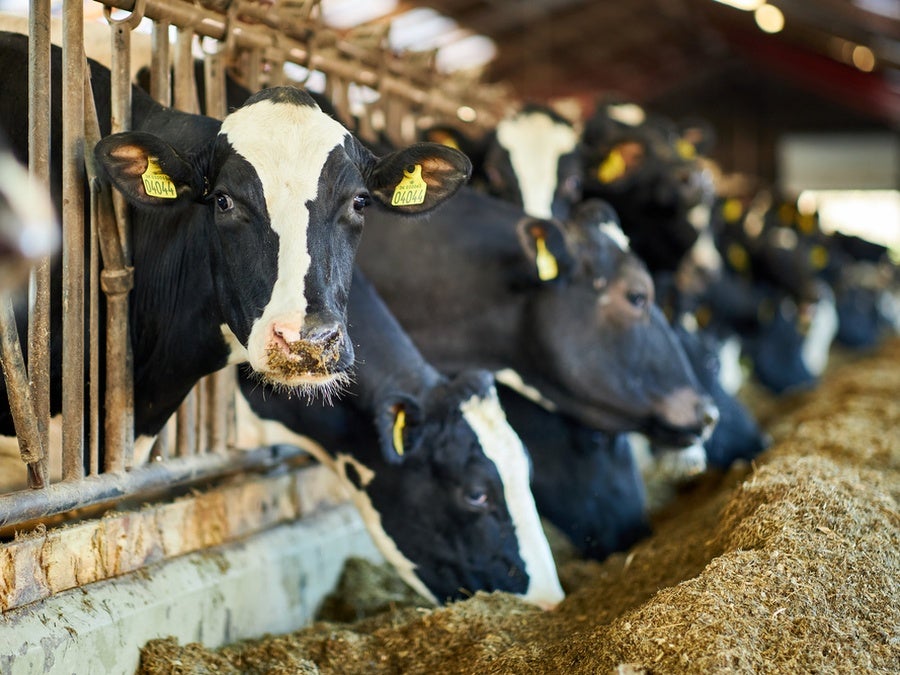
Denmark’s independent advisory council has recommended a farming emissions tax to help the country meet its climate targets.
The Danish Climate Council said introducing a tax of DKK750 (US$107) per tonne would “promote more climate-friendly agricultural production” and have “significant consequences for the agricultural economy – especially for cattle farming”.

Discover B2B Marketing That Performs
Combine business intelligence and editorial excellence to reach engaged professionals across 36 leading media platforms.
It suggested the tax would incentivise farmers to enhance crop production and move away from cattle farming, which emits more greenhouse gasses than other livestock farming, in a report published on Monday (20 February).
“Cattle producers in particular are hit financially by a tax,” the report states. “This is because the cattle producers have a large greenhouse gas emissions per DKK revenue compared to the other operating types.”
It follows the Danish government’s claim in December an emissions tax would be crucial to its target of reducing CO2 levels to 70% of 1990 levels by 2030 – the agricultural and forestry sector’s reduction target is 55-65%, the council said.
“A fee of DKK750 per tonne of CO2e will lead to technically driven reductions in agriculture corresponding to approximately 45% compared to the 1990 level,” it said.

US Tariffs are shifting - will you react or anticipate?
Don’t let policy changes catch you off guard. Stay proactive with real-time data and expert analysis.
By GlobalDataThe suggestions have been met with trepidation by the farming industry. Niels Peter Norring, head of climate at the Danish Agriculture & Food Council, warned that such taxes could lead to bankruptcies.
It would “move jobs abroad and prevent Denmark from developing the solutions that can really make a difference to the climate”, he told Reuters.
Danish-Swedish dairy cooperative Arla Foods told Just Food it did not believe the taxes were “a necessary, fair or ethical solution”.
Last year Arla launched its own sustainability initiative to encourage farmers to lower their carbon footprint by paying them based on their ‘green’ credentials. Its 8,900 European members are judged on a points system, gaining credits for things like fertiliser use, biodiversity work, renewable electricity and the green credentials of their feed.
A spokesperson told Just Food: “Arla Foods is, as part of the cluster of Danish food producers, a firm believer in further developing and supporting the already very efficient food production in Denmark. We acknowledge the need to transition to an even more sustainable way of producing and the most recent example of that is the voluntary introduction of our sustainability incentive model which will help us and our farmer owners achieve our ambitious targets.
“We believe that the incentive model alongside new technologies will enable us to reach our ambitions for 2030 of reducing our CO2 emissions by 63 per percent in scope 1 and 2 and 30 per cent per kilo of milk in scope 3.
“In that respect, we do not believe that a potential CO2 tax on biological processes is a necessary, fair or ethical solution, in a global context where demand for a healthy and nutritious diet – including dairy – is increasing, and where a tax will move production of dairy products to other countries with a higher CO2 footprint as a result.”
It follows a similar move by New Zealand last year to “price” agricultural greenhouse gas emissions. Supported by then-Prime Minister Jacinda Ardern, the proposals were aimed at cutting methane and nitrous oxide emissions but were heavily criticised by the country’s farmers’ federation.
In January, French dairy giant Danone said it intends to cut the methane emissions generated by the fresh milk used in its products by 30% by 2030. It expects to remove 1.2 million tonnes of the carbon dioxide equivalent of methane emissions.





